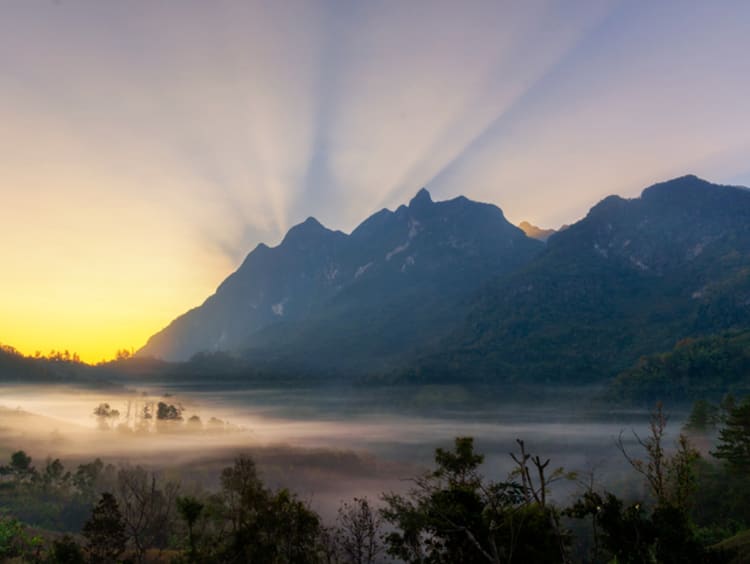Theology Thursday: Glorification and the Everlasting Life

The word “Glorification” refers especially to the time when — at the Parousia (the second coming of Jesus Christ) — both those who died in Christ and living believers will be given the resurrection of the body, a final and full “redemption of our body” (Romans 8:23), suited to the final state of the Christian believer.
In the death and resurrection of Jesus, not only is the price of our sin paid for, and our life after death secured, but the eternal life of God has truly come to this cursed earth. With the coming of the King, God’s kingdom has come into this world (John 3:16; 5:24; 6:40; 2 Corinthians 4:10-11). Because of King Jesus, there will be a physical life again after a period of physical death (1 Corinthians 15:44-46; 2 Corinthians 5:1-8).
God’s Plan to Be With Us
God’s plan has always been to have for himself a people (Genesis 17:7; Exo. 6:7; Ezekiel 34:24, 36:28; Jeremiah 7:23, 30:22, 31:33). This is a Gospel-driven church made up of Gospel-driven people who are passionate and driven to share the good news of God’s work. The church is an embassy — the colony of heaven — to which the victims of Satan’s tyrannical reign flee to escape this present evil age. There is no other name of any other king upon whom we may call to deliver us from our most dangerous foes but this one, who has descended and ascended and will come again for his own.
When Adam sinned, God cursed the ground because of him (Genesis 3:17-19), which created a need for the restoration of all things that God had created. This curse affected not only Adam and Eve but the entire created order. But, in Romans 8:21, the Apostle Paul promises a full and final restoration that God will bring in the form of changing death and decay into glorious life and liberty.
Paul explains that this will happen when we receive our resurrection bodies. In fact, he says the creation is somehow longing for that day:
“For the creation waits with eager longing for the revealing of the sons of God...We know that the whole creation has been groaning in travail together until now; and not only creation but we ourselves, who have the first fruits of the Spirit, groan inwardly as we wait for adoption as sons, the redemption of our bodies.” — Romans 8:19, 22-23
And then there’s this from famous Theology professor and author, Michael Horton:
“God’s eternal Son is present at the beginning of the story of creation (John 1:1-3; Colossians 1:15-20). He was the rock struck for Israel’s sins (1 Corinthians 10:4), and in the Bible’s closing book He is God’s last word, ‘Fear not, I am the first and the last, and the living one. I died, and behold I am alive forevermore, and I have the keys of Death and Hades’ (Revelation 1:17-18).”
Sharing in God’s Story
Christians often talk about living with God “in heaven” forever. But in fact, the biblical teaching is richer than that. It tells us that there will be new heavens and new earth — an entirely renewed creation — and we will live with God there. The Gospel is the consummation of the story of God, found in the re-birth or re-creation of an old, fallen humanity and world. What is amazing about Revelation 21 and 22 is the way that seemingly every strand of Scripture is drawn together and brought into its perfect conclusion.
The story of God begins and culminates in and through Christ’s redemptive work, seen in the creation of heaven and earth. The first two chapters in Genesis give us the creation of the first heavens and earth, while the final two chapters of Revelation illuminate the final creation of a new heaven and earth. Coming back to our old homeland is in keeping not only with our human nature but also with the character of God, who always finishes what he starts. He is “the Alpha and the Omega, the beginning and the end” (Revelation 21:6).
A New Way of Life and Relationship
The curse that Adam and Eve brought about in Genesis is now, through the person and work of Jesus Christ, fully defeated. When creation is recapitulated, the curse will be reversed. We are no longer living in paradise — our address is somewhere east of Eden. Humanity has fallen into sin and therefore has come under judgment.
When Adam and Eve ate the forbidden fruit, they were banished from the garden. This was partly an act of grace, as God was waiting for the second Adam to bring salvation, but it is an exile, nonetheless. Our great sin has brought endless woe on the human race: guilt, alienation, slavery, warfare and abuse.
As the Son of God, Jesus Christ has authority over life and death. By the power of his resurrection, he will never die again. And by that same power, he will raise every one of his followers to eternal life. The Gospel culminates in this truth: The person and work of Jesus Christ are completely adequate to bring the restoration of all things. Jesus was only the first to rise. His plan is for all of his children to rise and never to die again. No more death! The death of Christ is the death of death, and his resurrection is the birth of eternal life.
Want more? Check out all the articles from Theology Thursday and return each week for a new post. Learn more about the College of Theology by checking out our website or requesting more information with the button on this page.
The views and opinions expressed in this article are those of the author’s and do not necessarily reflect the official policy or position of Grand Canyon University. Any sources cited were accurate as of the publish date.


